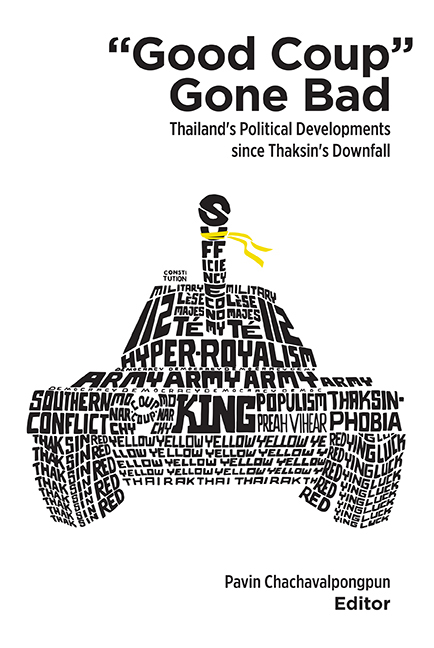Book contents
- Frontmatter
- Contents
- List of Tables and Figures
- Foreword
- Contributors
- Abbreviations
- Section I The 2006 Military Coup: Impact on the Thai Political Landscape
- Section II Defending the Old Political Consensus: The Military and the Monarchy
- 3 Broken Power: The Thai Military in the Aftermath of the 2006 Coup
- 4 The Monarchy and Anti-Monarchy: Two Elephants in the Room of Thai Politics and the State of Denial
- 5 Freedom and Silencing under the Neo-Absolutist Monarchy Regime in Thailand, 2006–2011
- Section III New Political Discourses and the Emergence of Yellows and Reds
- Section IV Crises of Legitimacy
- Index
- Plate Section
3 - Broken Power: The Thai Military in the Aftermath of the 2006 Coup
from Section II - Defending the Old Political Consensus: The Military and the Monarchy
Published online by Cambridge University Press: 21 October 2015
- Frontmatter
- Contents
- List of Tables and Figures
- Foreword
- Contributors
- Abbreviations
- Section I The 2006 Military Coup: Impact on the Thai Political Landscape
- Section II Defending the Old Political Consensus: The Military and the Monarchy
- 3 Broken Power: The Thai Military in the Aftermath of the 2006 Coup
- 4 The Monarchy and Anti-Monarchy: Two Elephants in the Room of Thai Politics and the State of Denial
- 5 Freedom and Silencing under the Neo-Absolutist Monarchy Regime in Thailand, 2006–2011
- Section III New Political Discourses and the Emergence of Yellows and Reds
- Section IV Crises of Legitimacy
- Index
- Plate Section
Summary
The notion of a “politicized” military most often evokes images of … men in uniforms issuing ultimatums to cowering civilian politicians.
Meyer, 1991–92, p. 5In 2006, the Thai military carried out a coup against the Thai Rak Thai party government of Thaksin Shinawatra, a government that had won two landslide elections within a two-year period, an unprecedented achievement in Thai history. Since that time, the military has governed Thailand for a year, it has exerted its influence to break up one coalition government and create an alternative coalition more to its liking, designed a new internal security law giving it wide-ranging domestic powers, and forcibly cracked down on large-scale demonstrations in Bangkok, with many lives lost in the suppression. Certainly this indicates the military has tremendous political power. Yet, the military as an institution today is broken. As a military institution it is at a nadir, politicized, internally divided, unprofessional, and therefore weak. In this chapter, it will be argued that, while seemingly powerful, the Thai military contains all the divisions and conflicts inherent in Thai society. It will be argued further that, if the military wishes to be institutionally strong, rather than politically strong, the only way out of this internal weakness is to leave politics behind, and embrace merit-based promotion and professionalism in its place.
MILITARIES AND SOCIETIES
In analysing the collapse of the 1991 attempted coup in the Soviet Union, Stephen Meyer set out to explain why the Soviet military did not unite behind the coup plotters, when it had much to gain in the event of success. The 1991 coup, which would spell the end of the Soviet Union, failed, according to Meyer, because the military was so divided by its involvement in politics, both as an institution and individually, that it could not unite, even under such circumstances. Under Glasnost, the military had been the focus of much criticism, and as the political system opened up, ambitious officers began to seek political office. The military was also divided by factionalism, particularly between junior and senior officers.
- Type
- Chapter
- Information
- Good Coup Gone BadThailand's Political Development since Thaksin's Downfall, pp. 49 - 78Publisher: ISEAS–Yusof Ishak InstitutePrint publication year: 2014

